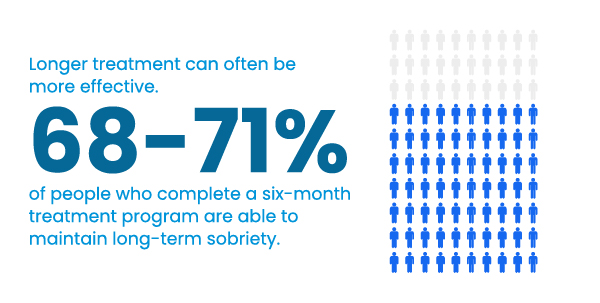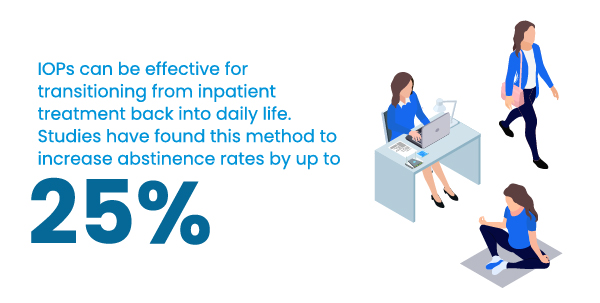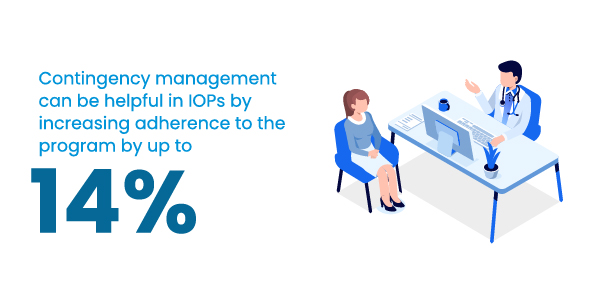How Long is Intensive Outpatient Treatment?
How long is intensive outpatient treatment? How effective are IOPs? Continue reading to find out.
How Long is Intensive Outpatient Treatment? The Basics
When you’re looking for addiction treatment, there are a lot of options available. It can get confusing to decide which option will be the right fit. If you’re looking into intensive outpatient care, you may be asking, “how long is intensive outpatient treatment?”
In this article, we’ll help answer that question. We’ll also detail factors that contribute to the length of treatment and what you should know before choosing an intensive outpatient program.

What Is an IOP?
IOP stands for “intensive outpatient program.” It is a form of addiction treatment where you are able to keep living at home. You will report to the treatment center at designated times throughout the week.
When you go to the treatment center, you will receive therapy, work on life skills, attend support group meetings, or get medical services. The overall structure of the program will depend on your needs and the treatment center.
Substance Misuse Treatment: an Inside Look
How Long is Treatment?
What is the Minimum Length of Care Needed to Get the Best Results?
Why Longer Treatment Can Be More Effective
Many studies have been conducted on this topic. Research has found that those who receive treatment for addiction that lasts six months or longer tend to get the best results. In fact, 68-71% of people who complete a six-month treatment program are able to maintain long-term sobriety. Some individuals may even require treatment for a year or longer.1
When someone requires longer-term care, an IOP can be a better treatment option. Intensive outpatient treatment allows you to remain living at home while you work on recovery. It provides more flexibility so you can still work, spend time with your family, and feel comfortable in your home environment.

IOPs as an Effective Transition
Who Are IOPs Best For?
Less Severe Addictions
Work or Family Obligations
Phasing Out of Inpatient Care
Accountability
Lastly, an IOP will be best for those who are able to hold themselves accountable during treatment. When you aren’t as heavily monitored or in the structured environment of an inpatient facility, it can pose its own unique challenges. If you’re able to stay on track without constant care, this is a good treatment option for you.
Take Note of Treatment Readiness
You need to know you’re ready to take on recovery head first before choosing outpatient care. So, when you’re asking, “how long is intensive outpatient treatment?” you should take that aspect into consideration.
When you begin working with a treatment center like Essence Healthcare, treatment professionals will help determine what type of care is best for your needs. Your best bet is to only choose an IOP if it is recommended as the best fit for your needs.
When are IOPs Necessary?
There are a wide variety of reasons why an intensive outpatient program might be a necessary treatment option for you. Typically, an intensive outpatient program will be a type of middle ground in terms of treatment intensity.
An intensive outpatient program will give you more time and medical attention than a full outpatient program. However, it requires less supervision than a full inpatient program. It is usually necessary when someone needs longer-term care or has not responded well to traditional outpatient care.
IOPs and Their Flexibility
You will spend part of your time in the medical care of a treatment center, while also being able to return home at night. Many studies have found intensive outpatient programs to be successful in reducing drug or alcohol intake for patients.
So if you are asking, “how long is intensive outpatient treatment?” you should also make sure you understand how beneficial it can be for patients who choose it.2

The Benefits of Intensive Outpatient Care
Maintain Family Support
Maintain Privacy
Lower Cost
Stay Present at School or Work
It can feel like a big decision having to choose between school or work and getting treatment. You may be worried about “how long is intensive outpatient treatment?” An IOP can help with that by creating a flexible schedule around other life responsibilities. Work or school can also provide a way to see tangible results from what you’ve been working on during recovery.
As you can see, intensive outpatient programs provide very flexible treatment options. If you’re wondering how long is intensive outpatient treatment and worried about how it will fit into your life, just know it may be more manageable than you think.

Statistics on the Effectiveness of Intensive Outpatient Programs
Many studies have been done on intensive outpatient programs and their effectiveness. One of the main things you should feel confident about is that IOPs have been offered by treatment centers for quite some time. Since 2011, IOPs have served about 12% of patients in rehab for addiction each year.
One study was conducted on the use of intensive outpatient programs after receiving inpatient treatment. The study found that using an IOP as a transitional tool back into daily life led to higher rates of abstinence three months after treatment (63% with an IOP compared to 38% without one). Those numbers alone show that IOPs definitely have their place in addiction treatment.
IOP: Evidence-Based Healing
What Treatments are Used During an IOP?
Cognitive Behavioral Therapy (CBT)
Cognitive Behavioral Therapy: a Closer Look
Motivational Interviewing
Motivational Interviewing
Group Therapy
Contingency Management
Adherence to treatment is crucial to get the best results. Contingency management helps by creating milestones and rewards for success throughout a treatment program. Studies have found this technique can increase adherence by up to 14%.6
As you can see, intensive outpatient programs provide very flexible treatment options. If you’re wondering how long is intensive outpatient treatment and worried about how it will fit into your life, just know it may be more manageable than you think.
12-Step Programs or Other Support Groups
Many treatment centers also offer 12-Step programs and other support groups during IOPs. Similar to group therapy, support groups can provide a sense of community and support from individuals who have similar experiences.
If you were wondering about how long is intensive outpatient treatment and what types of treatment options were available during that time, you should now have a good idea of the wealth of options available.
12 Step Programs for Recovery
How Do Different Types of Treatment Contribute to the Length of the Program?
If you’re wondering how long is intensive outpatient treatment, you may also wonder how different treatment options contribute to the program’s length. The real answer is again that it depends on the individual. Choosing a treatment modality that is the most effective for an individual’s specific needs can make the program more effective and quicker.
However, many treatment methods should be ongoing, such as therapy and support groups. Those forms of treatment, even as a form of aftercare, will be highly beneficial toward long-term success. When thinking about how long is intensive outpatient treatment, also consider what is best long-term to be the most successful in recovery. It’s worth putting in the extra effort.
How Long is Intensive Outpatient Treatment Compared to Other Options?
When thinking about how long is intensive outpatient treatment, you’ll probably also want to know how it compares to other treatment options. As mentioned earlier, an IOP is kind of a middle ground between different types of treatment. You can typically measure different types of care on five different levels. Those levels of care are:
- Level 1 – Early Intervention: This is intervening before substance abuse gets out of hand. Intervening early can help prevent any treatment from being necessary.
- Level 2 – Outpatient Treatment: Someone would choose a normal outpatient program when they aren’t likely to have withdrawal symptoms and know they can adhere to a program.
- Level 3 – Intensive Outpatient Treatment: Here’s where you’ll find the middle ground of an IOP. It offers a bit more medical care and support than outpatient while not being around-the-clock like inpatient.
- Level 4 – Inpatient Treatment: During inpatient treatment, you’ll stay at a treatment center for a duration of time. You’ll have around-the-clock support and medical attention during this time.
- Level 5 – Medically Managed Intensive Inpatient: This form of treatment is typically needed by those who have severe withdrawal symptoms or are likely to have serious withdrawals. It also could be necessary for those who haven’t adhered well to traditional inpatient care.
How Long is Intensive Outpatient Treatment Compared to Other Types of Rehab?
Now that we’ve covered the different types of treatment options, how long is intensive outpatient treatment compared to these options? Let’s see:
- Early intervention: This can last anywhere between one and ninety days. It’s usually dependent on how involved family and friends are in the individual’s life to ensure they stop drug use and how quickly they can stop using substances.
- Outpatient treatment: This usually lasts around ninety days, but some programs can last six months or longer.
- Intensive outpatient treatment: Typically lasts at least ninety days and up to a year or longer.
- Inpatient treatment: Usually lasts at least ninety days and can last up to two years or longer.
- Medically managed intensive inpatient treatment: This usually lasts at least six months and can go up to two years or longer. Those who complete intensive inpatient care are also often transitioned into other forms of treatment, like intensive outpatient, to help transition back into normal everyday life.
If you were wondering how long is intensive outpatient treatment compared to other options, you should be able to see it is also kind of a middle ground in the duration of time it requires.

Intensive Outpatient Treatment at Essence Healthcare
Our Approach
At Essence Healthcare, we use evidence-based practices during intensive outpatient programs. Using an evidence-based approach, we are able to help you achieve the best possible results. If you’re wondering about how long is intensive outpatient treatment here, our evidence-based approach leans toward longer-term care. Many studies have shown the effectiveness of completing treatment programs that are six months or longer. However, the length ultimately comes down to the individual’s needs.
Each program is tailored to the individual, the type and severity of addiction, and their daily schedule. During intensive outpatient care, you can tailor the schedule more toward your needs for work and family responsibilities. However, when considering how long is intensive outpatient treatment, taking more time for outside responsibilities can lead to longer care being necessary to get the best results.
How to Maintain Sobriety After Completing an Intensive Outpatient Program
Along with how long is intensive outpatient treatment, you must also think about what comes after completing the program. At Essence Healthcare, we make sure you’re set up with a relapse prevention plan and a general plan for success in maintaining sobriety. We teach healthy habits and positive lifestyles to make maintaining sobriety easier after completing an IOP.
Ultimately, instead of how long is intensive outpatient treatment, you should consider that recovery is ongoing, even after leaving the rehab center.
Aftercare at Essence Healthcare
Contact Essence Healthcare Today
If you want to know how long is intensive outpatient treatment at Essence Healthcare and get an idea of the best program for your needs, you can contact us today for more information. We’re here to answer any questions you may have.Resources
- https://www.tandfonline.com/doi/abs/10.1081/ada-200032290?journalCode=iada20
- https://www.ncbi.nlm.nih.gov/pmc/articles/PMC4152944/
- https://www.ncbi.nlm.nih.gov/pmc/articles/PMC4295122/
- https://www.ncbi.nlm.nih.gov/books/NBK64102/
- https://www.ncbi.nlm.nih.gov/pmc/articles/PMC2897895/
- https://www.ncbi.nlm.nih.gov/pmc/articles/PMC3083448/


